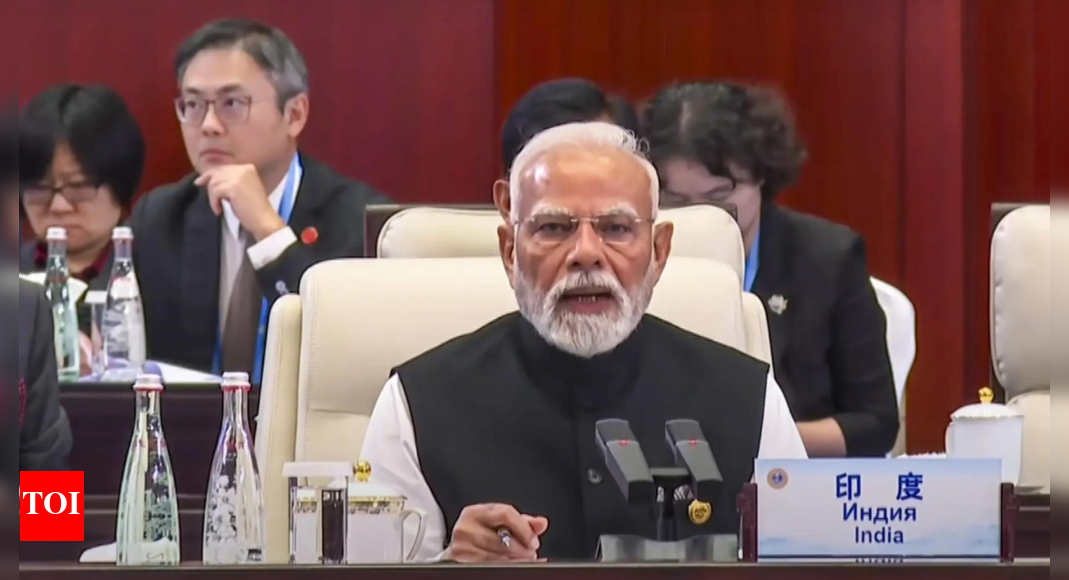India, alongside other SCO members, has strongly condemned the military actions by Israel and the US against Iran, citing violations of international law and threats to global peace. The Tianjin Declaration highlights concerns over civilian casualties and the…
Why it matters
- India and other members of the Shanghai Cooperation Organization (SCO) are voicing their strong opposition to military actions against Iran, underscoring a collective commitment to international law.
- The Tianjin Declaration emphasizes the need for dialogue and peaceful resolutions to conflicts, highlighting the risks of escalating violence in the region.
- This unified stance reflects growing geopolitical tensions and the importance of multilateral platforms in addressing global security issues.
In a recent gathering, India, together with fellow members of the Shanghai Cooperation Organization (SCO), has firmly denounced the military strikes conducted by the United States and Israel against Iran. This condemnation was articulated in the Tianjin Declaration, which raised alarms about potential breaches of international law and the implications for worldwide peace and stability.
The declaration was a significant collective response during the SCO summit, where member nations voiced their apprehensions regarding the increasing military engagements that could lead to heightened tensions in the Middle East. The leaders expressed particular concern over the impact of these strikes on civilian populations, calling attention to the humanitarian consequences that often accompany military interventions.
India’s position in this matter is critical, as it highlights its strategic role within the SCO, a group that includes several nations with vested interests in regional stability. The Indian government has reiterated its commitment to upholding international law and advocated for peaceful negotiations as the preferred method of conflict resolution. This stance not only aligns with India’s diplomatic principles but also reflects its broader foreign policy objectives aimed at fostering peace in volatile regions.
The summit’s discussions revealed a consensus among SCO members that the recent military actions exacerbate existing tensions and pose significant risks not only to Iran but to the broader geopolitical landscape. The declaration categorically condemned any actions that undermine the sovereignty of nations and emphasized the need for all countries to adhere to established international norms.
Moreover, the Tianjin Declaration called for a renewed commitment to dialogue and cooperation among nations, advocating for diplomatic efforts to resolve disputes without resorting to military force. This appeal for dialogue is particularly salient given the complexities of the Middle East, where various geopolitical interests intersect, often leading to conflicts that have far-reaching implications.
As global powers navigate these challenges, the SCO’s unified stance represents a significant counter-narrative to unilateral military interventions. The organization, which includes countries like Russia and China, has positioned itself as a platform for collaboration on security, economic, and cultural issues, aiming to promote a multipolar world order.
The implications of this collective condemnation extend beyond the immediate context of the US-Israeli actions against Iran. It signals a growing frustration among nations regarding the use of military force as a tool of foreign policy, particularly by Western powers. The SCO members are advocating for a more balanced approach to international relations, one that prioritizes diplomatic engagement over military solutions.
In light of these developments, the international community is urged to pay close attention to the potential fallout from the ongoing tensions in the region. With the SCO taking a firm stance, there is an opportunity for countries to reconsider their approaches to conflict resolution and to work collaboratively towards sustainable solutions.
The discussions at the summit underscore the importance of multilateral forums in addressing critical global issues, particularly in times of escalating conflict. The SCO’s commitment to peace, dialogue, and cooperation serves as a reminder of the potential for collective action in the face of challenges that threaten global security. As the situation unfolds, the role of organizations like the SCO will be pivotal in shaping responses to international conflicts and ensuring that the principles of international law are upheld.











